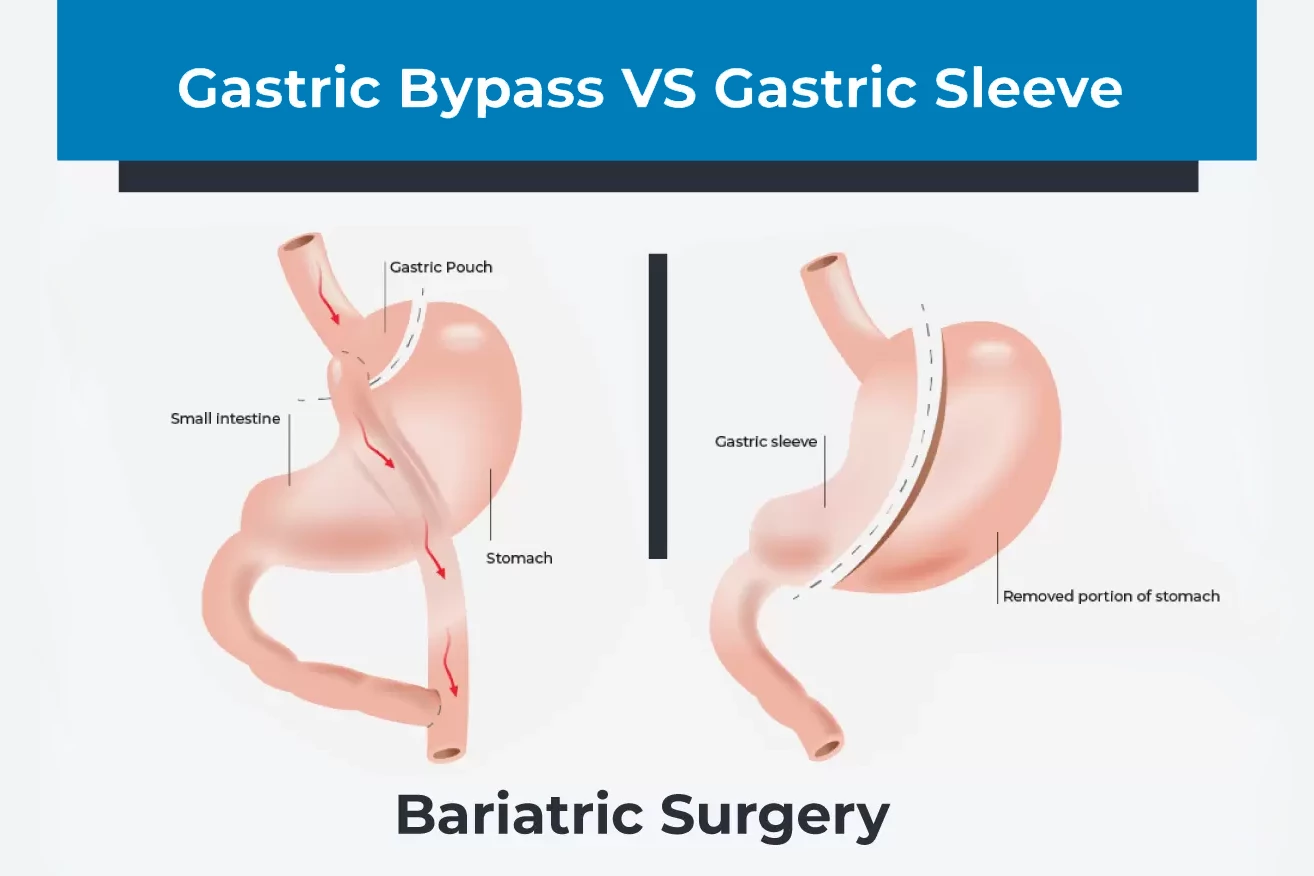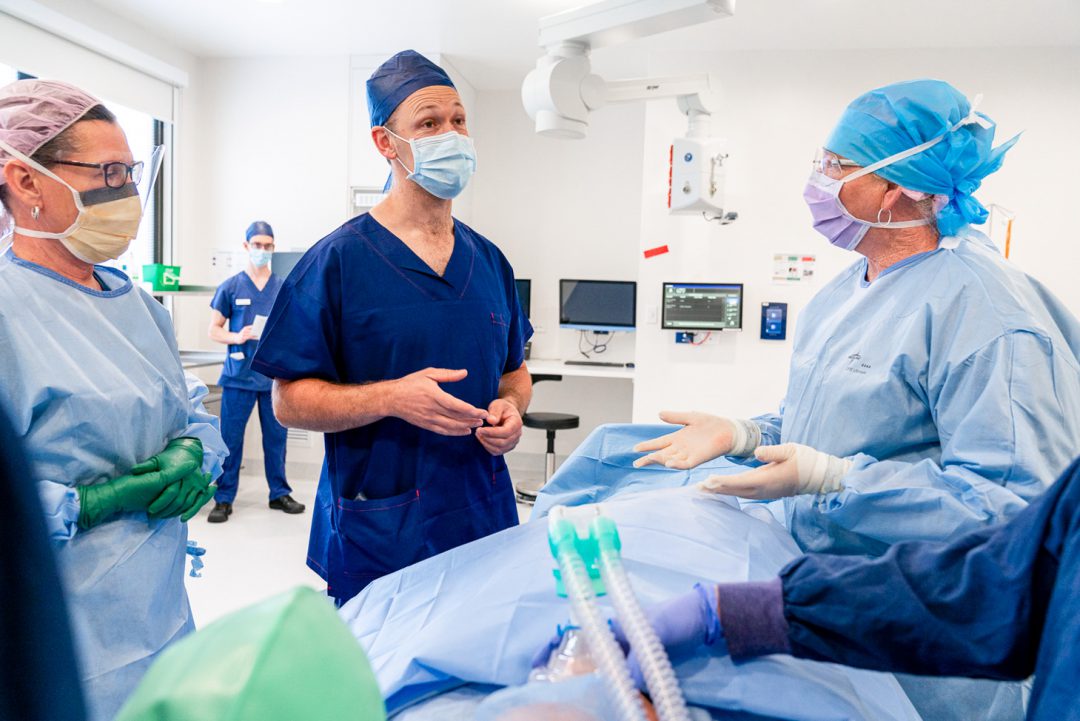What is the difference between gastric bypass and gastric sleeve surgery?
For many people losing weight is a long-term struggle. Diets and exercise can be helpful but often fails to help achieve and maintain long lasting weight loss. When surgery is part of the answer, two of the most common weight loss procedures are gastric sleeve surgery and gastric bypass surgery.
There are similarities between the two procedures, but there are also key differences.
In this article Dr Peter Hamer, leading Bariatric, Upper Gastrointestinal & General Surgeon on the Central Coast takes a closer look at both surgeries, what they entail and the pros and cons.

Gastric sleeve surgery
Sleeve gastrectomy is the most commonly performed weight loss operation in Australia and will often be the first choice for patients.
With gastric sleeve surgery, the surgeon permanently removes about 80 percent of the patient’s stomach.
What remains is a small banana-shaped stomach pouch, the shape of a shirt sleeve – hence the name. No other changes are made.
Sleeve gastrectomy has excellent weight loss outcomes. It is also has one of the lowest complication rates of all weight loss operations.
Gastric bypass surgery
Gastric bypass is probably the most established weight loss operation worldwide, with the best track record. With this procedure, also called Roux-en-Y gastric bypass, a small stomach pouch is created to limit how much you can eat. The small intestine is then sewn to the pouch “bypassing” most of your stomach and the first part of your small intestine.
The bypassed part of the stomach is attached further down the small intestine, so it still provides the acid and digestive enzymes produced there.
With this operation weight loss occurs in two ways, firstly by ‘restricting’ how much you can eat but also by the ‘bypass component’ of the surgery.
Both options are performed using keyhole surgery and usually require approximately 1-2 nights in hospital.
Pros and cons for gastric sleeve surgery
Gastric sleeve pros
- You can lose up to 65 percent of your excess body weight.
- It’s a one-step procedure so there’s a lower risk of complications.
- It the safest of the two operations
- There are fewer issues with absorbing nutrients and vitamins.
- Dumping syndrome is less common.
Gastric sleeve cons
- 40% of people can end up on medication for acid reflux.
- It may not be as effective at treating diabetes and metabolic syndrome as gastric bypass
- Weight regain can occur if poor choices are made in the years following surgery (this can also occur after bypass).
Pros and cons for gastric bypass surgery
Gastric bypass pros
- You can lose up to 80 percent of your excess body weight.
- Can be used to treat reflux as well as weight
- Is potentially more effective if you have medical problems such as diabetes or metabolic syndrome
- Although difficult, it can be reversed.
Gastric bypass cons
- As it is a more complex surgery complication rate is slightly higher
- The recovery is longer than for gastric sleeve surgery.
- Dumping syndrome is more common.
What is dumping syndrome? Dumping syndrome, also called rapid gastric emptying, occurs when food moves too quickly from the stomach into the first section of the small intestine, known as the duodenum. Symptoms of dumping syndrome include cramps, diarrhea, and nausea after eating, particularly after eating high-sugar foods. Treatment is to avoid eating high sugar foods.
Which surgery is right for you?
The type of weight loss surgery that’s right for you depends on several factors, including:
- your weight
- your medical history
- any health conditions you may have
- your expectations
Please discuss these factors with your doctor and whether weight loss surgery is an option for you. Together you can decide if one type of surgery is better suited for you.
Health benefits of weight loss surgery
Weight loss surgery is associated with many health benefits. In general, most people will feel an increase in energy levels and feel much better and healthier overall. It increases life-expectancy and decreases the chance of developing many medical problems.
Specific medical conditions such as diabetes, obstructive sleep apnoea (feeling tired in the mornings even after a full night’s sleep), high blood pressure, high cholesterol, aches, and pains in joints particularly knees and hips, polycystic ovary disease and fatty liver disease, all have been shown to improve after weight loss surgery.
Could you be an ideal candidate for weight loss surgery?
The friendly and supportive team at Dr Peter Hamer’s practice are here to help you on your weight loss journey. If you are interested in finding out more and booking a consultation, please contact our team today! Call (02) 4380 8404.






